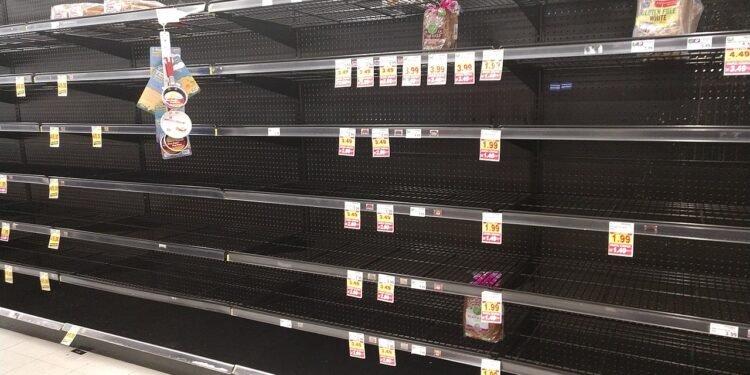BRUSSELS (Brussels Morning) – In a number of Brussels supermarkets, consumers are confronted with empty shelves. Hoarding is a fact and much more attention is being paid to the private labels of discount supermarkets. Their market share has been growing steadily since the 1980s and is certainly not at its peak yet. “Especially in Brussels, the entrepreneurs behind the organic supermarkets will feel this,” fears Gino Van Ossel, professor of Retail & Trade Marketing.
As the shelves of the Aldi supermarket in Auderghem show, customers are buying extra sunflower oil and flour. That is not due to the usual stock of flour and oil, but to the purchasing behaviour, it is said at Aldi.
“If everyone would consume normally, there would be no problem. But just like during corona with toilet paper, we see that shortages are now emerging because people fear that it will run out. A number of products are currently so popular that we have set a limit of three pieces per customer,” says Aldi spokesman Dieter Snoecks. He says that the phenomenon mainly occurs in the cities.
Earlier, Colruyt – the largest supermarket chain in the country – also announced that it would limit its sale of flour and oil. Lidl also followed suit and restricted the sale of oil, vegetable preserves and toilet paper. Two packs per customer are required for oil and vegetable preserves, three packs for toilet paper.
Ukraine and Russia are among the largest producers of wheat and sunflower oil worldwide. Due to the war, there are fears of supply problems and shortages, with possible price increases as a result. For the time being, this has not resulted in shortages in the stocks of supermarkets.
“But because of the reporting about the war in combination with a price increase, consumers are starting to stock up. But, with that we create a self-fulfilling prophecy, because that is how the real shortages arise,” says Brengman. According to her, setting limits on certain products is counterproductive. “Unintentionally, setting purchasing restrictions will act as a trigger for many people to buy more of them. This has been shown in previous scientific studies.”
While hoarding cannot always be explained logically, it is easier to understand why people switch to private labels. Groceries have become more expensive, according to a study by consumer association Test Aankoop. On average you will pay 18.9 percent more for tomatoes this year than last year.
Compare Prices
Comparing prices has therefore become a daily routine for more than four in five Belgians, according to a recent iVOX survey. Three out of four Flemish people more often put private labels in their shopping cart.
Supermarket chain Aldi lends the customer a hand. “Every week we will show the price difference between the same basket of A-brands for sale at Aldi and Aldi’s private labels. These own-brand products are often at least half cheaper than the A-brands, and you can feel that at the end of the month,” says Isabel Henderick, Managing Director Marketing and Communication.
The fact that people are moving away from A-brands is a typical phenomenon of consumer behaviour during a recession, says Brengman. “People are becoming more aware of their purchasing behaviour, especially because they are confronted so much with messages about price increases.”
“The qualities of private labels are very high with most products, the customer should hardly lose any experience. This way they can easily save without feeling too much. After a recession, they don’t necessarily go back to their A-brands from before, especially if they have little distinctive character. A-brands really have to reinvent themselves.”
Tip of the iceberg
Hoarding behaviour and switching to private labels are just the ‘tip of the iceberg’, says marketing expert and supermarket expert Gino Van Ossel. “Consumer confidence took a huge hit in March, according to the monthly measurement of the National Bank. We saw just after Putin’s raid on Ukraine that confidence has taken the biggest drop since the financial crisis of 2008.”
This means that people fear for the financial health of their families, a problem that they tackle with different strategies. “People are going to try to avoid purchases, they’re going to shop in cheaper stores, they’re buying more during promotions and switching to cheaper products and brands,” says Van Ossel.
According to Van Ossel, this is also reflected in the choice of supermarkets. The market share of discount supermarkets has been growing steadily since the 1980s (10 percent) to a fourfold increase (40 percent). That growth is unlikely to stop. “Especially in Brussels, the entrepreneurs behind the organic supermarkets will feel this,” Van Ossel fears.




